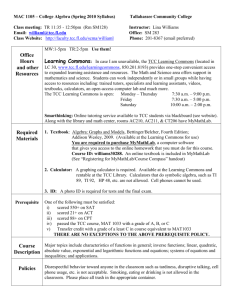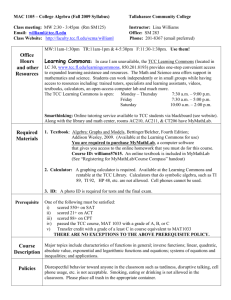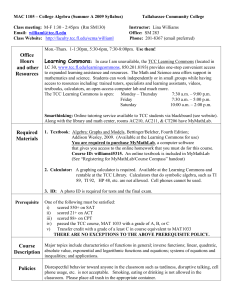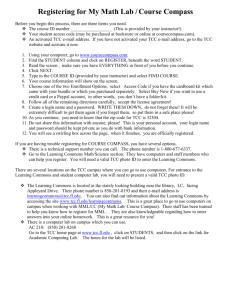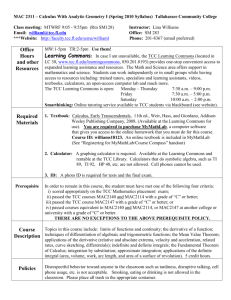MTH 163-PRE-CALC 1 - Tidewater Community College
advertisement
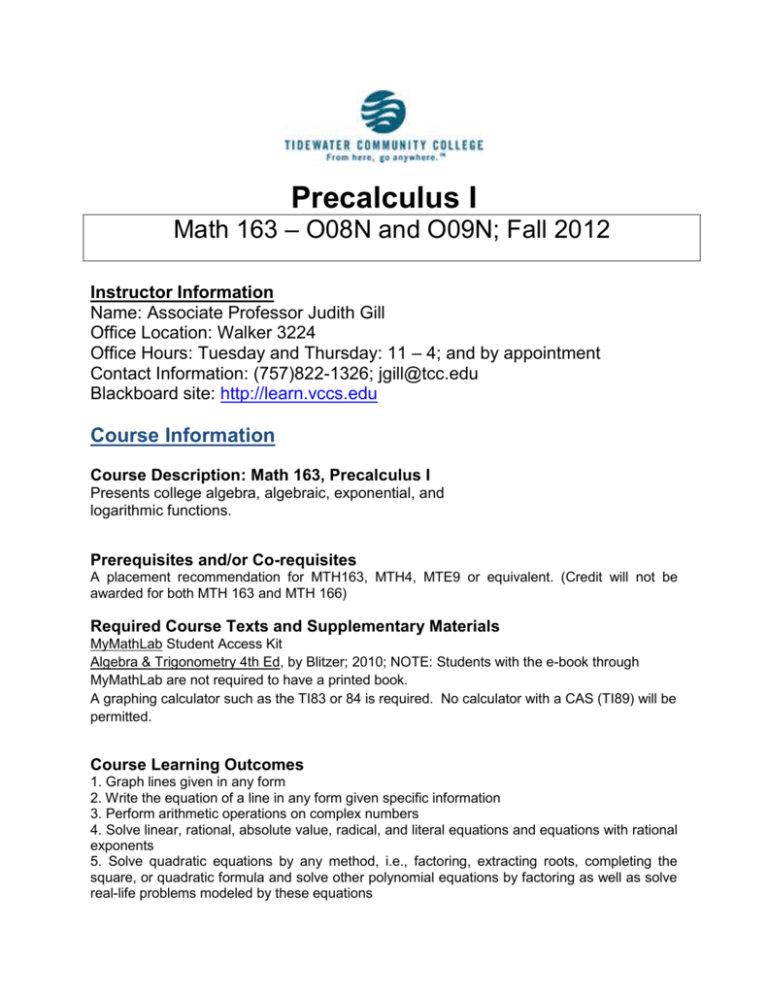
Precalculus I Math 163 – O08N and O09N; Fall 2012 Instructor Information Name: Associate Professor Judith Gill Office Location: Walker 3224 Office Hours: Tuesday and Thursday: 11 – 4; and by appointment Contact Information: (757)822-1326; jgill@tcc.edu Blackboard site: http://learn.vccs.edu Course Information Course Description: Math 163, Precalculus I Presents college algebra, algebraic, exponential, and logarithmic functions. Prerequisites and/or Co-requisites A placement recommendation for MTH163, MTH4, MTE9 or equivalent. (Credit will not be awarded for both MTH 163 and MTH 166) Required Course Texts and Supplementary Materials MyMathLab Student Access Kit Algebra & Trigonometry 4th Ed, by Blitzer; 2010; NOTE: Students with the e-book through MyMathLab are not required to have a printed book. A graphing calculator such as the TI83 or 84 is required. No calculator with a CAS (TI89) will be permitted. Course Learning Outcomes 1. Graph lines given in any form 2. Write the equation of a line in any form given specific information 3. Perform arithmetic operations on complex numbers 4. Solve linear, rational, absolute value, radical, and literal equations and equations with rational exponents 5. Solve quadratic equations by any method, i.e., factoring, extracting roots, completing the square, or quadratic formula and solve other polynomial equations by factoring as well as solve real-life problems modeled by these equations 6. Solve, graph, and write the solution in interval notation for linear and absolute values inequalities 7. Determine if a relation is a function and use function notation 8. Correlate the basic functions (including linear) to the characteristics of their graphs (shape, symmetry, intervals of increase/decrease, maxima, minima, even and odd behavior, domain, range), and use the characteristics and transformations to graph functions 9. Solve problems using the distance and midpoint formulas and use these formulas to derive the equations of circles and to graph circles 10. Add, subtract, multiply, divide, and compose functions as well as define the domains of the resulting functions 11. Find the inverse of a one-to-one function graphically and analytically 12. Graph quadratic functions by finding the vertex and use this information to solve application problems 13. Find zeros of polynomial functions using long polynomial division and synthetic division and use thisinformation to sketch the graph of a polynomial function and to solve polynomial inequalities 14. Graph rational functions using x-intercepts, y-intercepts, vertical asymptotes, horizontal asymptotes, and symmetry and use this information to graph rational inequalities 15. Evaluate and graph an exponential function 16. Define, evaluate, and graph a logarithmic function 17. Model and solve exponential and logarithmic equations based on real life scenarios (ex: exponential growth/decay of populations, compound interest in accounting) using the logarithmic-exponential relationship and logarithmic properties 18. Solve a system of equations or inequalities using an appropriate method including graphing, substitution, elimination, and matrices Topics Covered in the Course 1. Review of lines 2. Complex numbers 3. Solving equations 4. Inequalities 5. Basics of functions and their graphs 6. Algebra of functions 7. Inverse functions 8. Quadratic functions and their graphs 9. Polynomial functions and their graphs 10. Rational functions 11. Exponentials Course Schedule Please make sure to follow the Weekly Schedule closely. It is a separate document. The course schedule may change due to the progression of the course. The course schedule may change at the discretion of the instructor; however, students will be notified when any changes/additions are made to the schedule. Course Communication The best way to reach me is via email, jgill@tcc.edu . Every effort is made to respond to emails within 48 hours when classes are in session. TCC’s course Blackboard will explain how to get started in MyMathLab. Once you are in MyMathLab you will not need to return to TCC’s Blackboard unless directed. Course Policies 1. TCC Official Attendance Policy: All students are expected to be present and on time at all scheduled class and laboratory meetings. Instructors are not required to admit a student who arrives late to the classroom. A student who adds a class or registers after the first day of classes is counted absent from all class meetings missed. If a student is absent more than 15 percent of scheduled instructional time, attendance may be defined as unsatisfactory. This calculation includes absences occurring during the add/drop period. See also the Withdrawal Policy in this syllabus for more information. Per the college’s attendance policy, faculty has the right to develop a more stringent policy as well. Students who do not attend or participate in class by the deadline to drop for tuition refund may be deleted from the course. In an online class, if you are silent for 10 days you are in danger of being withdrawn. 2. Late Work/Make-up Exam Policy: Homework is due as stated in the Weekly Schedule. A one week extension on HW will carry a 25% penalty and must be requested via email. There will be no make up tests given. Please make sure to take tests according to the Weekly Schedule. There are two proctored exams. Please note the dates of the proctored exams. Students who are at a great distance (50+miles) from campus are responsible to find a proctored location where someone of authority can administer their test and give them access to a computer with an internet connection. Possible places are other community colleges, or libraries. The name, address, phone number, and official title of the Proctor must be included in an email from the Proctor sent to the Instructor in plenty of time for verification and arrangements to be made. Please allow at least 5-7 days before the test. 3. Statement on Classroom Behavior: TCC is committed to maintaining a social and physical environment conducive to carrying out its education mission. Therefore, all members of the TCC community are expected to demonstrate standards for civility. Be moderate in speaking. Loud, obscene, argumentative, or threatening speech is disruptive to teaching and learning and is offensive to others. It has no place in an academic setting. Resolve any disagreements in a positive, non-combative manner. Request the assistance of college authorities if needed. Show respect for the comfort of others in an educational setting by observing acceptable standards for personal cleanliness and dress. 4. Electronic Devices Policy: Cell phones, pagers, and other communication devices are prohibited from use in testing centers, classrooms, laboratories, and libraries, unless authorized. Although soundless communication devices such as cell phones and pagers are permissible in classrooms, college offices, and/or meeting rooms, they must not be answered during class or in testing centers. 5. Disposition of Classes for Emergency Shutdown of the College: In the event of an emergency shutdown of the college, the president and her executive staff may elect to conclude the term in session if eighty-five percent or more of that term has been completed. If the term in session is concluded, faculty shall compute final grades of students based on coursework completed at that point. Grade Policy For a grade of A you will need to earn 90-100% For a grade of B you will need to earn 80-89% For a grade of C you will need to earn 70-79% For a grade of D you will need to earn 60-69% below 60% results in grade of F. Grading: 11% Quiz 1 online 21% Test 1 proctored 11% Quiz 2 online 21% Test 2 proctored 11% Quiz 3 online 15% MyMathLab Homework 10% Unit Participation on Discussion Board on MyMathLab – see ‘Discussion Board’ button for details Optional Cumulative Final Exam (proctored) – can take the place of a missed or lower proctored test score. There are videos associated with each section. These videos are where you will receive much of your instruction. The videos are not graded so if a section is review, you may skip the video and only watch it if you feel it is necessary. The videos are only the beginning of the instruction in an online class. Each HW problem has a set of Learning Aids associated with it. They are in the form of buttons next to each problem. These Learning Aids are another mode of instruction in an online class. Feel free to use these Learning Aids as much as you like. They will not reduce your grade in any way. You may work each HW problem up to three times so there is no reason to get any grade other than 100% on HW. Remember, there are no Learning Aids available during tests so make sure you can work the problems without Learning Aids by the time you take the tests. It is a good idea to take the Practice Tests without the help of Learning Aids if possible. HW Due Dates: Following the HW pacing that is outlined in the Weekly Schedule will give you the best chance of success in this class. Extensions may be available at the instructor’s discretion and may involve a penalty. Email your instructor if you need an extension. Please note that all HW assignments must be completed by the last day of the testing window of each corresponding test. No extensions will be granted beyond that date. Discussion Board: You will need make several posts for each Chapter on the Discussion Board on MyMathLab (see MML for details). This is worth 10% of your grade so don’t ignore this requirement. More details are on the Discussion Board on MyMathLab. If you are caught cheating, you will receive an F in the course. If you miss more than 15% of the class periods, you may be withdrawn from the course. That means if you are silent for 10 days you are in danger of being withdrawn! Final grades are made available to each student within the Student Information System (SIS) now web delivered via MyTCC or SIS. Based on the progression of the course, the grade distribution for each assignment may change. However, if changes are made, I will notify students in a timely manner and in writing. Students are responsible for maintaining their computer equipment and if a problem cannot be fixed immediately, they are required to report it to their instructors and to come to the Math Lab in room 3205 or use an alternate computer to work until their equipment is working properly. Please make sure your computer meets the system requirements as listed on the welcome page. If not, you may need to plan to attend the math lab in room 3205 to keep yourself up to date. If you have extenuating circumstances, please contact your instructor for a possible alternate schedule for catching up and completion of lessons. Academic Policies Students are responsible for being aware of the policies, procedures, and student responsibilities contained within the current edition of the TCC Catalog and Student Handbook. Students should familiarize themselves with the college's policies regarding misconduct and inclement weather found in the Student Handbook. Withdrawal Policy Students who wish to withdraw without academic penalty should contact a counselor to determine the appropriate procedure. Withdrawals through completion of 60 percent of a session will result in a W grade. After 60 percent of a session is completed, a withdrawal will result in a grade of F in a credit course or a grade of U in a developmental course, except under mitigating circumstances that must be documented by the instructor and approved by the academic dean. Dynamic session classes have unique refund and withdrawal dates. Contact a campus Enrollment Services Office for more information, or visit http://www.tcc.edu/students/calendar/academic/Dynamic.htm. A student who drops after the last day to withdraw does not receive a "W." He/she receives an "F," in which case there is both an academic and financial penalty. A student who withdraws by the deadline faces a financial penalty, but not an academic penalty. ACADEMIC CALENDAR - FALL 2012 SEMESTER August 23 Classes begin August 30 Last day to add or change for a 16-week course September 3 Labor Day (college closed) September 10 Last day to drop for tuition refund from a 16-week course September 1 Fall 2012 Graduation Application Deadline (Applications not received by the deadline will be processed the following term) November 1 Last day to withdraw without academic penalty from a 16-week course November 22,23,24 Thanksgiving Day Holiday (college closed) December 11-17 Final Exams, exact dates tba by your instructor (Last day of instruction December 10) Returning students eligible for Spring registration may do so via Web Academic Integrity TCC will expect students to demonstrate personal and academic integrity, to be open to new ideas, and to share in a community where individuals from diverse backgrounds and cultures help one another grow intellectually, socially, and personally. TCC expects students to achieve, not just to get by. And while many caring and talented faculty and staff are here to help, students must take responsibility for their own learning. Students should strive for a high level of academic performance and to be responsible, contributing citizens within the college and in outside communities. Above all, TCC wants students to develop a love of learning that will last a lifetime, along with a life-long interest in maintaining emotional and physical wellness. Statement on Plagiarism and Academic Misconduct Academic misconduct includes, but is not limited to, the following actions: cheating on an examination or quiz—either giving or receiving information; copying information from another person for graded assignments; using unauthorized materials during tests; collaboration during examinations; buying, selling or stealing examinations; arranging a substitute for oneself during examinations; substituting for another person, or arranging such a substitution; plagiarism—the intentional or accidental presentation of another’s words or ideas; collusion with another person or persons in submitting work for credit in class or lab, unless such collaboration is approved in advance by the instructor. Faculty members who have reliable evidence of academic misconduct will (1) investigate the matter, and (2) review the facts of the matter and the proposed penalty with the appropriate academic dean. They may then take one or more of the following actions: Require the work to be accomplished again Give no credit for the test, paper, or exercise Assign a grade of F, U, or W for the course Refer the matter to the campus Dean for Student Services or designee for possible disciplinary sanction through the college’s disciplinary procedure If the faculty member chooses to refer the matter to the campus Dean for Student Services or designee for disposition, the Plenary Disciplinary Procedure shall be followed, and the student’s dismissal from the college is a possibility. Disability Services Students who have documented, diagnosed disabilities, and who need special accommodations for tests, etc., are advised to see the Disabilities Services staff in Student Services so that the instructor may be notified of what accommodations are appropriate in each case. Requests for accommodations should be made to the designated campus disability services counselor at least 45 days before classes begin. Documentation must be provided to support the need for accommodations. For assistance with disabilities, contact the campus Disabilities Counselor/Provider or the Coordinator of Learning Disabilities Services: call 822-1213, visit Student Services/Development, or visit the Disability Services webpage at http://www.tcc.edu/students/specialized/disabilityservices/index.htm Emergency Procedures In the event of a bomb threat, tornado, or fire, students and staff may be asked to evacuate the building or move to a secure location within the building. Evacuation routes for movement to an external location or to a shelter within the building are posted at the front of the room. Students should review the maps and make sure that the exit route and assembly location for the building are clearly understood. If assistance is required during an evacuation, please let the instructor know at the end of the first class. Tidewater Community College uses TCC Alerts to immediately contact and inform faculty, staff and students of a major crisis or emergency. TCC Alerts delivers important emergency alerts, notifications, and updates via: Email account (work, home, other) Cell phone Pager Smartphone/PDA (BlackBerry, Treo & other handhelds) When an incident or emergency occurs, authorized senders will be instantly notified via TCC Alerts. TCC Alerts is a personal connection to real-time updates, instructions on where to go, what to do, or what not to do, who to contact, and other important information. New users may also register by sending a text message to 411911keyword: TIDEWATER. Student Success Resources The following resources are available to TCC students. See the Student Handbook or visit http://www.tcc.edu/forms/handbook/ for more information about student services and locations. Learning Resource Centers Each campus houses a library and media resources in a Learning Resources Center (LRC). A separate slide and print library is located at the Visual Arts Center. The Learning Resources Centers contain research materials in both print and electronic format to support the courses, curricula, and mission of the college. Library materials include books, newspapers, magazines, journals and an extensive collection of indexes, abstracts and full text databases. Media resources include videotapes, audiotapes, films, CD-ROM/DVD, computer files, and other audiovisual materials. Visit this site for more information: www.tcc.edu/lrc/ Academic Support Services Each campus provides various kinds of academic assistance. One-on-one tutoring, math and computer labs, and other forms of individual and group assistance may be available. Students can also find free help for writing, from short questions about commas and comma splices to a comprehensive review of research papers in progress, in the Writing Centers. Online Help Desk Visit the following Distance Learning Resources for Students website for information about computer skills, technical support, library services for online students, and much more: http://www.tcc.edu/students/dtls/ Important Websites College Website: www.tcc.edu Blackboard and Student E-mail: https://tcc.my.vccs.edu/jsp/home.jsp Student Handbook: http://www.tcc.edu/forms/handbook/ TCC Catalog: http://www.tcc.edu/forms/catalog/ Class Schedule: http://www.tcc.edu/schedule/ (or log-in to SIS for current course offerings) Academic Calendar: http://www.tcc.edu/students/calendar/academic/index.htm Distance Learning Resources: http://www.tcc.edu/students/dtls/


